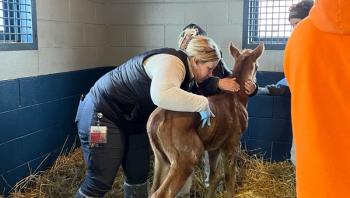
OVMA readies to weigh in on dangerous dog law
The law fails to provide dog owners a meaningful opportunity to be heard on the issue.
COLUMBUS, OHIO-An Ohio Supreme Court decision deeming the state's dangerous dog law unconstitutional has veterinary leaders and dog wardens on high alert.
In a 4-3 decision, justices stripped wardens of their authority to determine whether dogs are vicious and/or dangerous - a move critics claim impacts public protection. At the same time, the ruling leaves the injured law vulnerable to attempted rewrites from stakeholders on both sides of the issue.
At presstime, the Ohio Veterinary Medical Association's (OVMA) Legislative Committee awaits lawmakers' attempts to open Ohio Revised Code (ORC) 955.22 in an effort to rework the dangerous dog directive that, among other things, claims Pit Bulls are a dangerous breed. For that reason, the public will be best served if veterinarians have their hands in the review, OVMA Executive Director Jack Advent says.
"The biggest issue in this, quite honestly, is the one that deals with breed specific mention in Ohio law," he says. "Once the law's opened, people are going to argue whether it's fundamentally flawed because it discriminates against a specific breed. We'll be that scientific voice of reason in the middle of what I'm sure will be an emotional debate. There's no question in my mind that we have an important role to play."
Taking a stance
While OVMA has no formal position on breed specific language, Advent surmises the group will mirror the American Veterinary Medical Association's (AVMA) stance, which supports dangerous animal legislation provided it does not refer to specific breeds or classes of animals.
"My instinct is that OVMA will say clearly, breed specific legislation is the wrong way to go," he says. "We're going to review the decision as well as the current law as it pertains to vicious dogs and look at it in the context of what modifications might be beneficial to the existing statute. We're trying to anticipate what might be proposed and how we should react. I hope that as lawmakers look at this issue, they ask for our opinions."
Protecting society
Tom Skeldon, of Lucas County, wants lawmakers to consider dog wardens' views, too. While breed specifics don't weigh heavily on Skeldon's mind, the dogcatcher who covers the Toledo area claims the Supreme Court erred on the side of dogs, not constituents, and the decision bars him from doing his job.
"Because of this ruling, if a dog went out and attacked somebody and then went out running around, I couldn't write the owner up for violating any vicious dog law," he says. "I have analysis from my county prosecutor that allows me to continue to enforce the law where Pitt Bulls are concerned, but not where dogs that have mauled people.
"I don't understand this decision. I can read it, but to me, it's not a logical and thoughtful opinion written by the majority."
State v. Cowan
Grasping the court's ruling means understanding the case behind it. In the Supreme Court's review State v. Cowan, Portage County resident Janice Cowan challenges the classification of her two dogs as dangerous-a label that laid the groundwork for her trial court conviction, which called for five days in jail, a $500 fine and an order that she surrender her animals.
According to court documents, Cowan's two dogs attacked a neighbor in October 2001. Following the incident, a dog warden deemed the animals vicious, requiring Cowan to carry additional liability insurance and confine the dogs in a manner compliant with Ohio code. When Cowan reportedly failed to comply with the vicious-dog law, she was charged with a series of misdemeanors.
In her motion to dismiss, Cowan challenges the ruling on grounds the law violates due process by granting dog wardens "unfettered discretion" to label animals as vicious. There was no means for Cowan to appeal the determination and, apparently, the high court agreed.
"R.C. 955.22 violates the constitutional right to procedural due process insofar as it fails to provide dog owners a meaningful opportunity to be heard on the issue of whether a dog is 'vicious' or 'dangerous,' " the ruling states. "Even assuming that R.C. 955.22 provides a meaningful opportunity to be heard on a dog's classification, it is certainly unconstitutional as applied here."
Newsletter
From exam room tips to practice management insights, get trusted veterinary news delivered straight to your inbox—subscribe to dvm360.





